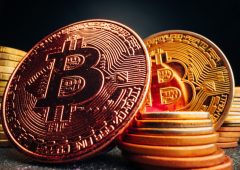Why Nations Are Rushing to Reconsider Bitcoin as a Strategic Reserve Asset
Central banks worldwide are quietly building Bitcoin positions—and the move could reshape global finance forever.
The Digital Gold Rush Heats Up
Forget the cautious whispers from a few years back. Sovereign wealth funds and treasury departments now treat Bitcoin like a legitimate hedge against currency devaluation. They're not just dipping toes—they're diving in headfirst.
Bypassing Traditional Financial Gatekeepers
Bitcoin cuts out the middlemen that have controlled international reserves for decades. No more relying on correspondent banking networks or political alliances that shift with the wind. The network operates 24/7 without asking permission.
Inflation Protection That Actually Works
While central bankers print money like there's no tomorrow, Bitcoin's fixed supply acts as a permanent anchor. Nations watching their dollar reserves evaporate through inflation finally have an escape hatch.
The New Geopolitical Chessboard
Countries facing sanctions or dollar dependency see Bitcoin as their financial independence card. It's becoming the ultimate tool for sovereign nations tired of playing by rules written in Washington and Brussels.
Of course, traditional finance types will call it reckless—right before they quietly allocate 1% of their own portfolios. Because nothing says 'serious investment' like following the lead of governments you claim are being irresponsible.
Rethinking volatility
Critics dismiss bitcoin as speculative because of its price swings. Yet, volatility has often worked in its favor. Over its 16-year history, the asset has never been cheaper four years later than it was on the same date before. This pattern matters because governments, unlike retail investors, operate with long time horizons. What may look risky on a daily chart can translate into stability and compounding strength over decades.
Investment versus reserve status
For sovereign wealth funds and pension managers, the draw of Bitcoin lies in potential price appreciation. But central banks face a different question: can Bitcoin function as a true reserve asset? Reserve selections are not made for short-term gains but for liquidity, trust, and universality. U.S. Treasuries filled that role since 1944, and gold has endured for millennia. Both, however, are showing cracks.
Decline of Treasuries, rise of gold
Foreign ownership of Treasuries has dropped from about half in 2008 to just 30% in 2023. The shift stems from both the “weaponization” of the dollar through sanctions and the weak real returns Treasuries delivered. As reliance on Treasuries fades, central banks have been aggressively turning to gold. Purchases have more than doubled since 2022, lifting demand to record highs and sending prices NEAR all-time peaks.
READ MORE:
Where Bitcoin fits in
This context gives Bitcoin new relevance. Like gold, it is neutral, borderless, and resistant to censorship. Unlike gold, it is digital, portable, and programmable. As a result, some economists see it as a potential third pillar of sovereign reserves, a complement rather than a replacement for Treasuries and gold. The concept of a “Strategic Bitcoin Reserve” is gaining attention, particularly as governments weigh how to prepare for an increasingly multipolar financial order.
In short, the case for national Bitcoin exposure is less about chasing returns and more about strategic resilience. States that adopt it early may find themselves better positioned for a world where financial sovereignty is measured not just in dollars and gold, but also in satoshis.
![]()



